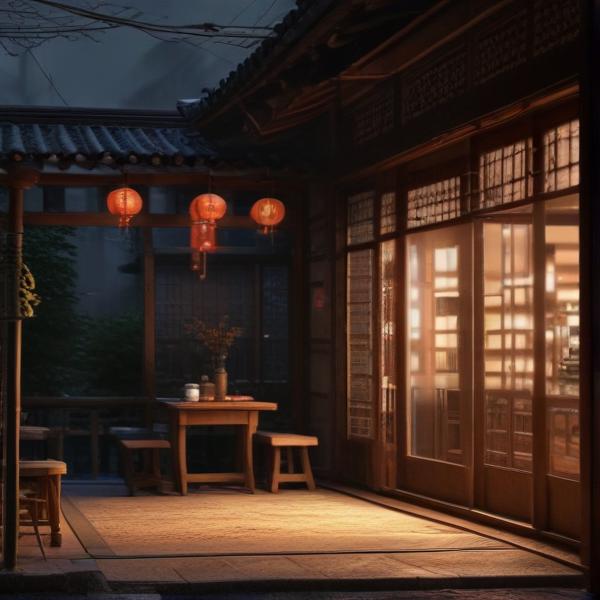基本信息 (Basic Information)
含义与用法 (Meanings & Usage)
中文核心释义 (Core Chinese Meaning): 繁茂、香气浓厚、忧愁、积聚不畅。
英文核心释义 (Core English Meaning): lush, dense (of vegetation), rich fragrance, melancholy, or pent-up feelings.
象形意义 / 为何这么写 (Pictographic Meaning / Writing Rationale)
文言文释义 (Classical Chinese Meaning)
文言文中“郁”主要表示香气浓烈、草木繁茂、气息郁结,有时也指情感积聚。与现代意义相近。In Classical Chinese, '郁' mainly means strong fragrance, lush vegetation, or accumulated (pent-up) energy or emotion–similar to the modern meaning.
深入学习 (In-depth Study)
字源故事 (Origin Story)
字形演变 (Character Evolution)
常用词语和例句 (Common Words & Examples)
郁郁葱葱 (luxuriant and verdant; lush and green)
夏天的山林郁郁葱葱,生机勃勃。
Eng: The forested mountains are lush and full of life in summer.
郁闷 (depressed; gloomy; feeling pent-up)
最近因为工作压力大,他感到很郁闷。
Eng: Lately, he has been feeling quite depressed due to work pressure.
芬芳郁郁 (richly fragrant; full of fragrance)
花园里花香芬芳郁郁,沁人心脾。
Eng: The fragrance in the garden is richly aromatic and refreshing.
相关成语 (Related Idioms)
郁郁寡欢
Meaning: depressed and rarely cheerful
多语言翻译 (核心释义) (Translations (Core Meaning))
- French: luxuriant, dense, mélancolique
- German: üppig, dicht, melancholisch
- Spanish: frondoso, denso, melancólico
- Italian: lussureggiante, denso, malinconico
- Portuguese: luxuriante, denso, melancólico
- Russian: густой, пышный, меланхоличный
- Arabic: وافِر، كثيف، كئيب
- Persian: انگُل، متراکم، افسرده
- Dutch: weelderig, dicht, melancholiek
- Polish: bujny, gęsty, melancholijny
- Vietnamese: tươi tốt, rậm rạp, sầu muộn
- Ukrainian: густий, пишний, меланхолійний
视频学习资源 (Video Learning Resources)
通过以下链接在热门视频网站搜索 "郁" 的更多讲解:
Search for more explanations of "郁" on popular video sites:
- 在 Bilibili.com 搜索 "郁 字源 说文解字" (Search on Bilibili)
- 在 YouTube.com 搜索 "郁 character origin etymology" (Search on YouTube)
网络参考 (Web References for "郁") ()
网络内容摘要 (Web Content Summary):
郁(拼音:yù)是常用汉字,原为古地名,后引申为文采丰盛、草木繁茂或香气浓烈等义。Yù is a common Chinese character. It originally referred to an ancient place name, and later extended to mean abundant literary talent, luxuriant vegetation, or intense fragrance.
-
字形与起源: “郁”的繁体为“鬱”,最早见于商代甲骨文。字形常与植物、香气等意义相关。 Origin: The traditional form is “鬱”, which first appeared in oracle bone script during the Shang dynasty. The character shape is often related to plants and fragrance.
-
主要含义:草木茂盛、香气浓烈、文采丰富;也常指忧愁、愁闷(如“郁郁寡欢”)。 Main meanings: Luxuriant plants, rich fragrance, literary talent; it can also mean melancholy or depression, as in the expression “郁郁寡欢” (depressed and joyless).
-
常见用法: “郁”常见于成语“馥郁”(fù yù,意为芳香、香气浓烈)、“郁闷”(yù mèn,意为心情不畅)、“郁郁葱葱”(植物茂盛)。 Common usage: Appears in idioms such as “馥郁” (rich fragrance), “郁闷” (depressed mood), and “郁郁葱葱” (lush greenery).
-
易混淆点: “郁”是“鬱”的简化字,繁体和简体在日常语境中意思相同,但书写形式不同。 Potential confusion: “郁” is the simplified form of “鬱”; both share the same meaning in everyday language, but differ in script.
-
文化补充: “郁”或“鬱”也可以用作姓氏。 Cultural note: “郁” or “鬱” can also be used as a family name.
信息补充:现有公开资源对“郁”的字形起源细节有限。如果需深入研究,建议查阅专业汉字字源辞典。 Additional note: Detailed information on the origin of the shape of “郁” is limited in public resources. For further research, consulting specialized etymological dictionaries is recommended.
郁(汉语文字)_百度百科
郁(拼音:yù),是汉语通用规范一级字(常用字)。"郁"最早见于小篆文字,本义是指古代的一个地名,后来引申指文采丰盛的。郁又为"鬱"的简化字,该字最早见于商代甲骨文。本义为蹂躏,后引申为香气浓烈。"郁、鬱"均可作为姓氏。现今简化字将"鬱"简化为"郁"字 。
汉字"郁"的起源、演变过程-汉字字源辞典
汉字字源辞典收录7747条汉字词条,基本涵盖了常见汉字的字源解析,是汉字研究的必备工具。 ... 鬱"有採集香料之意,字典亦將"馥郁"之"郁"作"鬱"解,然《新華字典》第11版中"郁"字有四個義項,其中1.草木茂盛,2.憂愁,愁悶兩個義項繁體為"鬱 ...
更多图片 (郁 More Images) ()
